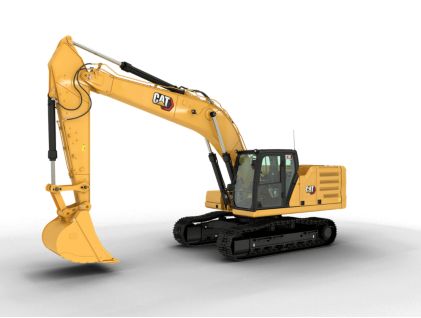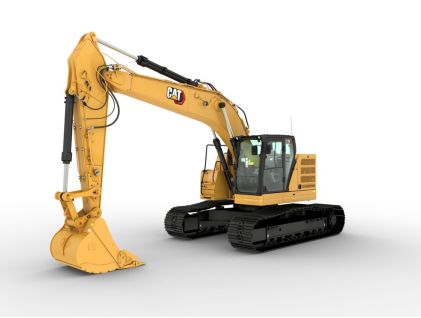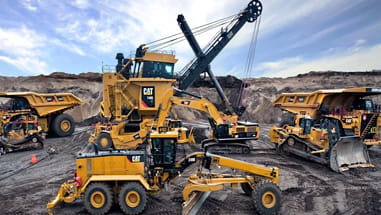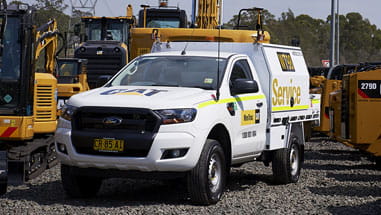With our huge inventory of new, used and rental equipment, WesTrac has the right machine for the job.
Excavators
Compare Models



UNITS:
Metric
Imperial
Engine
Net Power - ISO 9249
203.7 kW
273 hp
203.7 kW
273 hp
128.5 kW
172 hp
Net Power - ISO 9249 (DIN)
277 hp (metric)
277 hp (metric)
277 hp (metric)
277 hp (metric)
175 hp (metric)
175 hp (metric)
Engine Model
Cat® C7.1
Cat® C7.1
Cat® C7.1
Cat® C7.1
Cat® C4.4
Cat® C4.4
Engine Power - ISO 14396:2002
205 kW
275 hp
205 kW
275 hp
129.4 kW
174 hp
Engine Power - ISO 14396 (DIN)
279 hp (metric)
279 hp (metric)
279 hp (metric)
279 hp (metric)
176 hp (metric)
176 hp (metric)
Bore
105 mm
4 in
105 mm
4 in
105 mm
4 in
Stroke
135 mm
5 in
135 mm
5 in
127 mm
5 in
Displacement
7.01 l
428 in³
7.01 l
428 in³
4.4 l
269 in³
Biodiesel Capability
Up to B20¹
Up to B20¹
Up to B20¹
Up to B20¹
Up to B20¹
Up to B20¹
Emissions
Meets U.S. EPA Tier 4 Final, EU Stage V, Korea Stage V, and Japan 2014 emission standards.
Meets U.S. EPA Tier 4 Final, EU Stage V, Korea Stage V, and Japan 2014 emission standards.
Meets U.S. EPA Tier 4 Final, EU Stage V, and Japan 2014 emission standards.
Meets U.S. EPA Tier 4 Final, EU Stage V, and Japan 2014 emission standards.
Meets U.S. EPA Tier 4 Final, EU Stage V, and Japan 2014 emission standards.
Meets U.S. EPA Tier 4 Final, EU Stage V, and Japan 2014 emission standards.
Note (1)
Net power advertised is the power available at the flywheel when the engine is equipped with fan, air intake system, exhaust system and alternator with engine speed at 2,200 rpm. Advertised power is tested per the specified standard in effect at the time of manufacture.
Net power advertised is the power available at the flywheel when the engine is equipped with fan, air intake system, exhaust system and alternator with engine speed at 2,200 rpm. Advertised power is tested per the specified standard in effect at the time of manufacture.
Net power advertised is the power available at the flywheel when the engine is equipped with fan, air intake system, exhaust system, and alternator with engine speed at 2,200 rpm. Advertised power is tested per the specified standard in effect at the time of manufacture.
Net power advertised is the power available at the flywheel when the engine is equipped with fan, air intake system, exhaust system, and alternator with engine speed at 2,200 rpm. Advertised power is tested per the specified standard in effect at the time of manufacture.
Net power advertised is the power available at the flywheel when the engine is equipped with fan, air intake system, exhaust system, and alternator with engine speed at 2,200 rpm. Advertised power is tested per the specified standard in effect at the time of manufacture.
Net power advertised is the power available at the flywheel when the engine is equipped with fan, air intake system, exhaust system, and alternator with engine speed at 2,200 rpm. Advertised power is tested per the specified standard in effect at the time of manufacture.
Note (2)
¹Cat diesel engines are required to use ULSD (ultra-low sulfur diesel fuel with 15 ppm of sulfur or less) or ULSD blended with the following lower-carbon intensity fuels** up to: 20% biodiesel FAME (fatty acid methyl ester)* or 100% renewable diesel, HVO (hydrotreated vegetable oil) and GTL (gas-to-liquid) fuels.Refer to guidelines for successful application. Please consult your Cat dealer or “Caterpillar Machine Fluids Recommendations” (SEBU6250) for details. *Engines with no aftertreatment devices can use higher blends, up to 100% biodiesel (for use of blends higher than 20% biodiesel, consult your Cat dealer). **Tailpipe greenhouse gas emissions from lower-carbon intensity fuels are essentially the same as traditional fuels.
¹Cat diesel engines are required to use ULSD (ultra-low sulfur diesel fuel with 15 ppm of sulfur or less) or ULSD blended with the following lower-carbon intensity fuels** up to: 20% biodiesel FAME (fatty acid methyl ester)* or 100% renewable diesel, HVO (hydrotreated vegetable oil) and GTL (gas-to-liquid) fuels.Refer to guidelines for successful application. Please consult your Cat dealer or “Caterpillar Machine Fluids Recommendations” (SEBU6250) for details. *Engines with no aftertreatment devices can use higher blends, up to 100% biodiesel (for use of blends higher than 20% biodiesel, consult your Cat dealer). **Tailpipe greenhouse gas emissions from lower-carbon intensity fuels are essentially the same as traditional fuels.
¹Cat diesel engines are required to use ULSD (ultra-low sulfur diesel fuel with 15 ppm of sulfur or less) or ULSD blended with the following lower-carbon intensity fuels** up to: 20% biodiesel FAME (fatty acid methyl ester)* or 100% renewable diesel, HVO (hydrotreated vegetable oil) and GTL (gas-to-liquid) fuels. Refer to guidelines for successful application. Please consult your Cat dealer or “Caterpillar Machine Fluids Recommendations” (SEBU6250) for details. *Engines with no aftertreatment devices can use higher blends, up to 100% biodiesel (for use of blends higher than 20% biodiesel, consult your Cat dealer). **Tailpipe greenhouse gas emissions from lower-carbon intensity fuels are essentially the same as traditional fuels.
¹Cat diesel engines are required to use ULSD (ultra-low sulfur diesel fuel with 15 ppm of sulfur or less) or ULSD blended with the following lower-carbon intensity fuels** up to: 20% biodiesel FAME (fatty acid methyl ester)* or 100% renewable diesel, HVO (hydrotreated vegetable oil) and GTL (gas-to-liquid) fuels. Refer to guidelines for successful application. Please consult your Cat dealer or “Caterpillar Machine Fluids Recommendations” (SEBU6250) for details. *Engines with no aftertreatment devices can use higher blends, up to 100% biodiesel (for use of blends higher than 20% biodiesel, consult your Cat dealer). **Tailpipe greenhouse gas emissions from lower-carbon intensity fuels are essentially the same as traditional fuels.
¹Cat diesel engines are required to use ULSD (ultra-low sulfur diesel fuel with 15 ppm of sulfur or less) or ULSD blended with the following lower-carbon intensity fuels** up to: 20% biodiesel FAME (fatty acid methyl ester)* or 100% renewable diesel, HVO (hydrotreated vegetable oil) and GTL (gas-to-liquid) fuels. Refer to guidelines for successful application. Please consult your Cat dealer or “Caterpillar Machine Fluids Recommendations” (SEBU6250) for details. *Engines with no aftertreatment devices can use higher blends, up to 100% biodiesel (for use of blends higher than 20% biodiesel, consult your Cat dealer). **Tailpipe greenhouse gas emissions from lower-carbon intensity fuels are essentially the same as traditional fuels.
¹Cat diesel engines are required to use ULSD (ultra-low sulfur diesel fuel with 15 ppm of sulfur or less) or ULSD blended with the following lower-carbon intensity fuels** up to: 20% biodiesel FAME (fatty acid methyl ester)* or 100% renewable diesel, HVO (hydrotreated vegetable oil) and GTL (gas-to-liquid) fuels. Refer to guidelines for successful application. Please consult your Cat dealer or “Caterpillar Machine Fluids Recommendations” (SEBU6250) for details. *Engines with no aftertreatment devices can use higher blends, up to 100% biodiesel (for use of blends higher than 20% biodiesel, consult your Cat dealer). **Tailpipe greenhouse gas emissions from lower-carbon intensity fuels are essentially the same as traditional fuels.
Hydraulic System
Main System - Maximum Flow
560 l/min (148 gal/min)
560 l/min (148 gal/min)
560 l/min (148 gal/min)
560 l/min (148 gal/min)
429 l/min (113 gal/min)
429 l/min (113 gal/min)
Maximum Pressure - Equipment
35000 kPa
5075 psi
35000 kPa
5075 psi
35000 kPa
5075 psi
Maximum Pressure - Equipment - Lift Mode
38000 kPa
5510 psi
-
-
Maximum Pressure - Travel
35000 kPa
5075 psi
35000 kPa
5075 psi
34300 kPa
4974 psi
Maximum Pressure - Swing
29800 kPa
4320 psi
28800 kPa
4175 psi
27500 kPa
3988 psi
Swing Mechanism
Swing Speed
11.5 r/min
11.5 r/min
10.8 r/min
10.8 r/min
11.25 r/min
11.25 r/min
Note (1)
For CE-marked machine default value may be set lower.
For CE-marked machine default value may be set lower.
For CE-marked machine default value may be set lower.
For CE-marked machine default value may be set lower.
For CE-marked machine default value may be set lower.
For CE-marked machine default value may be set lower.
Maximum Swing Torque
110 kN·m
81132 lbf·ft
107.7 kN·m
79455 lbf·ft
82 kN·m
60300 lbf·ft
Weights
Operating Weight
31400 kg
69200 lb
34900 kg
77000 lb
22600 kg
49800 lb
Note
Long undercarriage, Reach boom, R3.2 m (10'6") stick, Heavy Duty (HD) 1.76 m³ (2.30 yd³) bucket, 800 mm (31") triple grouser shoes and 6700 kg (14,770 lb) counterweight.
Long undercarriage, Reach boom, R3.2 m (10'6") stick, Heavy Duty (HD) 1.76 m³ (2.30 yd³) bucket, 800 mm (31") triple grouser shoes and 6700 kg (14,770 lb) counterweight.
Long undercarriage Reach boom, R3.2 (10'6") stick, Heavy Duty (HD) 1.54 m³ (2.01 yd³) bucket, 600 mm (24") triple grouser shoes, 5000 kg (11,202 lb) counterweight and 3440 mm (11'3") blade.
Long undercarriage Reach boom, R3.2 (10'6") stick, Heavy Duty (HD) 1.54 m³ (2.01 yd³) bucket, 600 mm (24") triple grouser shoes, 5000 kg (11,202 lb) counterweight and 3440 mm (11'3") blade.
Reach boom, R2.9 (9'6") stick, Heavy Duty (HD) 1.19 m³ (1.56 yd³) bucket 790 mm (31") triple grouser shoes, 4200 kg (10,400 lb) counterweight.
Reach boom, R2.9 (9'6") stick, Heavy Duty (HD) 1.19 m³ (1.56 yd³) bucket 790 mm (31") triple grouser shoes, 4200 kg (10,400 lb) counterweight.
Service Refill Capacities
Fuel Tank Capacity
474 l
125.2 gal (US)
368 l
97.2 gal (US)
345 l
86.6 gal (US)
Cooling System
25 l
6.6 gal (US)
13 l
3.3 gal (US)
25 l
6.6 gal (US)
Engine Oil
25 l
6.6 gal (US)
25 l
6.6 gal (US)
15 l
4 gal (US)
Swing Drive
10 l
2.6 gal (US)
-
-
Final Drive - Each
5.5 l
1.5 gal (US)
7 l
1.8 gal (US)
4 l
1.1 gal (US)
Hydraulic System - Including Tank
310 l
81.9 gal (US)
350 l
92.5 gal (US)
234 l
61.8 gal (US)
Hydraulic Tank
147 l
38.8 gal (US)
154 l
40.7 gal (US)
115 l
30.4 gal (US)
DEF Tank
41 l
10.8 gal (US)
26 l
7 gal (US)
39 l
10.3 gal (US)
Swing Drive - Each
-
11 l
2.9 gal (US)
6 l
1.6 gal (US)
Dimensions
Boom
Reach 6.15 m (20'2")
Reach 6.15 m (20'2")
Reach 6.15 m (20'2")
Reach 6.15 m (20'2")
Reach 5.7 m (18'8")
Reach 5.7 m (18'8")
Stick
Reach 3.2 m (10'6")
Reach 3.2 m (10'6")
Reach 3.2 m (10'6")
Reach 3.2 m (10'6")
Reach 2.9 m (9'6")
Reach 2.9 m (9'6")
Bucket
HD 1.76 m³ (2.30 yd³)
HD 1.76 m³ (2.30 yd³)
HD 1.54 m³ (2.01 yd³)
HD 1.54 m³ (2.01 yd³)
1.19 m ³ (1.56 yd³)
1.19 m ³ (1.56 yd³)
Shipping Height - Top of Cab
3060 mm
10 ft
3270 mm
10.7 ft
2960 mm
9.7 ft
Handrail Height
3060 mm
10 ft
3430 mm
11.2 ft
2950 mm
9.7 ft
Shipping Length
10420 mm
34.2 ft
9830 mm
32.2 ft
9530 mm
31.3 ft
Tail Swing Radius
3130 mm
10.3 ft
1900 mm
6.2 ft
2830 mm
9.3 ft
Counterweight Clearance
1120 mm
3.7 ft
1170 mm
3.8 ft
1050 mm
3.4 ft
Ground Clearance
490 mm
1.6 ft
480 mm
1.6 ft
470 mm
1.5 ft
Track Length
4860 mm
15.9 ft
5030 mm
16.5 ft
4450 mm
14.6 ft
Length to Center of Rollers
3990 mm
13.1 ft
4040 mm
13.3 ft
3650 mm
11.7 ft
Track Gauge
2590 mm
8.5 ft
2740 mm
9 ft
2380 mm
7.8 ft
Transport Width
3390 mm
11.1 ft
3340 mm
11 ft
2980 mm
9.8 ft
Working Ranges and Forces
Maximum Digging Depth
7240 mm
23.9 ft
6990 mm
22.9 ft
6720 mm
22 ft
Boom
Reach 6.15 m (20'2")
Reach 6.15 m (20'2")
Reach 6.15 m (20'2")
Reach 6.15 m (20'2")
Reach 5.7 m (18'8")
Reach 5.7 m (18'8")
Stick
Reach 3.2 m (10'6")
Reach 3.2 m (10'6")
Reach 3.2 m (10'6")
Reach 3.2 m (10'6")
Reach 2.9 m (9'6")
Reach 2.9 m (9'6")
Bucket
HD 1.76 m³ (2.30 yd³)
HD 1.76 m³ (2.30 yd³)
HD 1.54 m³ (2.01 yd³)
HD 1.54 m³ (2.01 yd³)
1.19 m ³ (1.56 yd³)
1.19 m ³ (1.56 yd³)
Maximum Reach at Ground Level
10680 mm
35 ft
10640 mm
34.9 ft
9860 mm
32.3 ft
Maximum Cutting Height
10030 mm
32.9 ft
11150 mm
36.6 ft
9370 mm
30.7 ft
Maximum Loading Height
6950 mm
22.8 ft
7960 mm
26.1 ft
6490 mm
21.3 ft
Minimum Loading Height
2300 mm
7.5 ft
2910 mm
9.5 ft
2170 mm
7.1 ft
Maximum Depth Cut for 2440 mm (8 ft) Level Bottom
7090 mm
23.3 ft
6840 mm
22.4 ft
6550 mm
21.5 ft
Maximum Vertical Wall Digging Depth
6010 mm
19.7 ft
5790 mm
19 ft
5190 mm
17 ft
Bucket Digging Force - ISO
179 kN
40200 lbf
207 kN
46482 lbf
150 kN
38811 lbf
Stick Digging Force - ISO
126 kN
28300 lbf
144 kN
32319 lbf
106 kN
23911 lbf
Air Conditioning System
Air Conditioning
The air conditioning system on this machine contains the fluorinated greenhouse gas refrigerant R134a (Global Warming Potential = 1430). The system contains 0.85 kg (1.9 lb) of refrigerant which has a CO2 equivalent of 1.216 metric tonnes (1.340 tons).
The air conditioning system on this machine contains the fluorinated greenhouse gas refrigerant R134a (Global Warming Potential = 1430). The system contains 0.85 kg (1.9 lb) of refrigerant which has a CO2 equivalent of 1.216 metric tonnes (1.340 tons).
-
The air conditioning system on this machine contains the fluorinated greenhouse gas refrigerant R134a (Global Warming Potential = 1430). The system contains 0.85 kg (1.9 lb) of refrigerant which has a CO2 equivalent of 1.216 metric tonnes (1.340 tons).
The air conditioning system on this machine contains the fluorinated greenhouse gas refrigerant R134a (Global Warming Potential = 1430). The system contains 0.85 kg (1.9 lb) of refrigerant which has a CO2 equivalent of 1.216 metric tonnes (1.340 tons).
Note (1)
-
The air conditioning system on this machine contains the fluorinated greenhouse gas refrigerant R134a (Global Warming Potential = 1430). The system contains 0.9 kg (1.98 lb) of refrigerant which has a CO2 equivalent of 1.287 metric tonnes (1.418 tons).
The air conditioning system on this machine contains the fluorinated greenhouse gas refrigerant R134a (Global Warming Potential = 1430). The system contains 0.9 kg (1.98 lb) of refrigerant which has a CO2 equivalent of 1.287 metric tonnes (1.418 tons).
-
Sustainability
Recyclability
98%
98%
97%
97%




